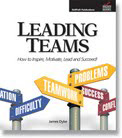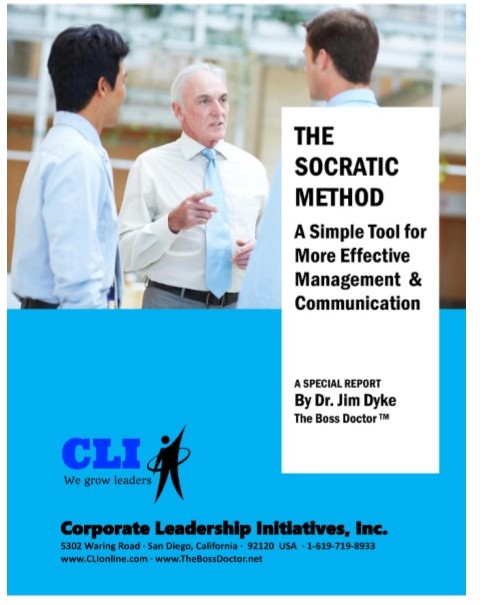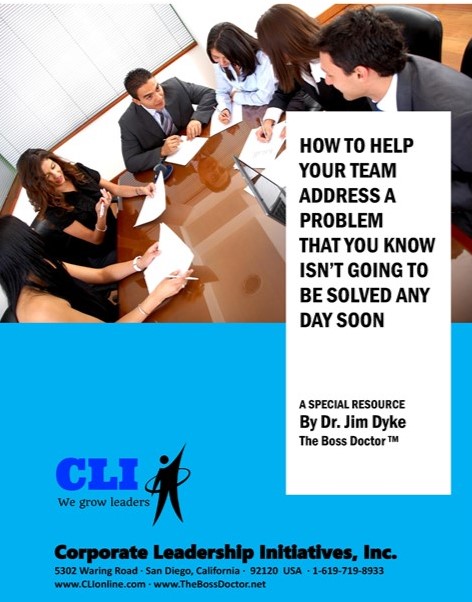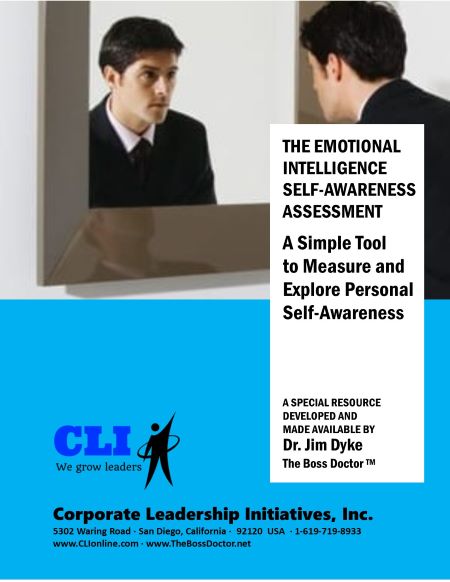Leading Teams – How to Inspire, Motivate, Lead, and Succeed
This new book by Dr. Jim Dyke is filled with practical insights and concrete tools to equip you to be a leader of influence and inspiration. Discover the secret to dynamic, effective team leadership and use the information to help you become a more effective leader.
Download a Sample | A Description of Leading Teams
Management Consulting, Corporate Training, Executive Coaching
Let “The Boss Doctor” help you and your people become more effective and productive! Your organization can benefit from the impressive array of tools and resources that he can provide, including a full range of training and consulting support drawn from strategic alliances with other experts in the field. Dr. Dyke can also coach you or your leaders individually and confidentially – to target specific areas of personal and professional development in order to overcome bad habits; develop new skills; and attain specific growth and development goals. Contained within are descriptions of just some of the many services and training topics available.
View the Catalog| Consulting Schedule
Top Ten Habits of Highly Likeable People
Studies in the workplace show that likeable people get more promotions; are seen by others as having more credibility; are more readily forgiven for their mistakes; and exert greater influence as collaborators and colleagues. This practical white paper will show you the simple behaviors that effective leaders adopt, to become more engaging, persuasive, and influential!
View or Download this White Paper
The Socratic Method – A Simple Tool for More Effective Management and Communication
Socrates was a master educator who was renowned for his ability to teach by simply posing questions to his students. As a result, they were forced to think, analyze, and consider rather than look to Socrates for easy answers and uncontested direction. In short, they acquired the valuable skill of critical thinking.
I teach my executive coaching clients the same technique as a way to gently and tactfully develop their team members; collaborate more effectively across the organization; and diplomatically leverage the wisdom of their boss and other higher-ups.
This compilation of previously published content outlines The Socratic Method with enough detail (and examples) to enable the reader to acquire and apply this communication tool and become more engaging, influential, and persuasive.
How to Help Your Team Address a Problem That You Know Isn’t Going to Be Solved Any Day Soon
Managing the Anger of a Frustrated Team
Every organization has its problems—that’s the nature of management reality! The dark side to this fact is that many of these problems never get addressed, solved, or eliminated. When one of these problems is an obstacle to you and your team’s success, that creates another even deeper problem—the frustration and anger of your team! That can destroy a team’s cohesion, morale, and productivity. What’s a leader to do???? This informative guide is filled with practical insights and tips to help you join forces with your people and tackle those annoying and frustrating obstacles.
The Emotional Intelligence Self-Awareness Assessment
A Simple Tool Designed to Measure and Explore Your Self-Awareness
Higher levels of leadership effectiveness are associated with higher levels of emotional intelligence. Foundational to effective emotional intelligence is healthy self-awareness. The challenge for leaders is to determine their level of self-awareness. The dilemma is immediately apparent: If one is not self-aware, how can one possibly know it, since the awareness of the problem requires the quality of self-awareness itself??
This tool is specially-designed to address this challenge and help an individual measure and explore their self-awareness.
View or Download This Resource
Are You “Disagree-ABLE?”
How to be a leader who can harness the power of diverse, challenging, even opposing viewpoints and ideas.
Are you (and your people) comfortable with constructive conflict? Can they disagree with you? Can YOU accept their disagreement with YOU without becoming defensive or combative? You hold the keys to creating an atmosphere of open communication and honest exchange. Use these five key questions to help you explore your ability to sustain creative and constructive conflict.








